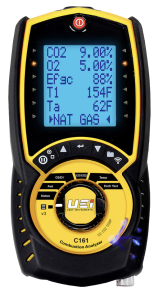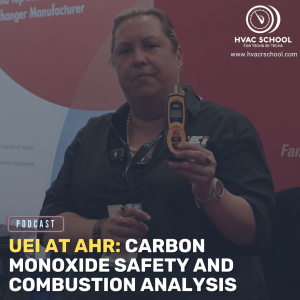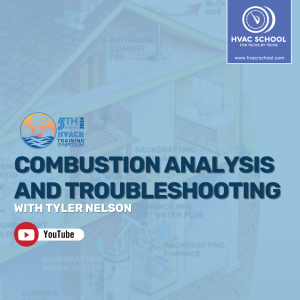BACK
 The Chemistry of Combustion In the Wild
The Chemistry of Combustion In the Wild
 Combustion Testing Doesn’t Stop in the Summer
Combustion Testing Doesn’t Stop in the Summer
 Practical Uses of Combustion Analysis
Practical Uses of Combustion Analysis
 The Case for Buying a Combustion Analyzer
The Case for Buying a Combustion Analyzer
 What Does “Air Free CO” (Carbon Monoxide) Mean?
What Does “Air Free CO” (Carbon Monoxide) Mean?
 Gas & Combustion Safety w/ Bert
Gas & Combustion Safety w/ Bert
 IAQ for the HVAC Technician w/ Brynn Cooksey
IAQ for the HVAC Technician w/ Brynn Cooksey
 UEI at AHR: Carbon Monoxide Safety and Combustion Analysis
UEI at AHR: Carbon Monoxide Safety and Combustion Analysis
 Why and How of Combustion Analysis w/ Tyler Nelson
Why and How of Combustion Analysis w/ Tyler Nelson
#carbon monoxide
Tech Tips:

If you’ve been following my writing for the last couple of years, you know that I like to blather on and on about combustion analysis. Now, I am by no means an expert on the subject, as I live in North Texas (which is not known for its intense heating season), but I love using […]
Read more

This tech tip was written by Casey Contreras. Casey is a field coach and instructor for the National Comfort Institute (NCI). Thanks, Casey! As HVAC technicians, our careers often focus on either cooling or heating. Because of this split view, we typically ignore gas-fired appliances during the cooling season. There are dangers lurking in any […]
Read more

This tech tip reviews the live stream by the same name aired on November 1st, 2023. You can watch the full live stream HERE. We want to give special thanks to the guests: Jim Bergmann, Jim Davis, Tony Gonzalez, Louise Kellar, Bill Spohn, and Tyler Nelson! Gas furnaces (or any combustion equipment) create a controlled […]
Read more

Last year, I bought my first combustion analyzer. I had just started my own company and felt the additional weight of responsibility to sit down and determine the best way to verify that the furnaces I was servicing were working safely. In the past, the most extensive testing I had done was a visual inspection […]
Read more

Almost everyone knows that CO (carbon monoxide) is really nasty stuff and nothing to play around with. Humans will often begin exhibiting symptoms of CO poisoning at 200 ppm (parts per million) of CO in a space. Studies have also shown that the effects of CO exposure can accumulate over time, resulting in health […]
Read more
Videos:
Podcasts:

In this informative episode, Bryan and Bert dive deep into gas appliance safety and combustion analysis from the unique perspective of Florida HVAC technicians. While they humorously acknowledge that Florida's mild winters mean they don't work on gas furnaces daily, they make a compelling case that this actually makes their training even more critical. […]
Read more

In this episode from the 6th Annual HVACR Training Symposium, Brynn Cooksey, a home performance contractor from Michigan and technical training business owner, reveals how indoor air quality (IAQ) testing transformed his contracting business from a commodity service into a profitable specialty. Cooksey shares his proven methodology for turning IAQ into an “instant profit […]
Read more

In this informative podcast episode, Bryan from HVAC School is joined by Louise Keller, the National Training Manager for UEI Test Instruments, to discuss the critical importance of carbon monoxide safety and proper combustion analysis. The conversation begins with lighthearted banter about the previous night's Tactical Awards ceremony before diving into the serious topic […]
Read more

Bryan Orr interviews Tyler Nelson, an HVAC expert with over 20 years of experience as a contractor. They have an in-depth discussion about combustion analysis and why it is becoming increasingly important for HVAC technicians to utilize this process. The conversation provides an overview of combustion analysis benefits and why HVAC pros should incorporate […]
Read more













